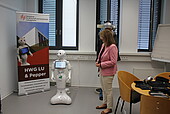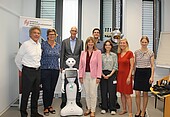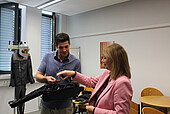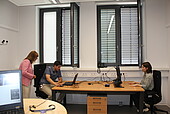As part of her summer trip, State Secretary Nicole Steingaß from the Ministry of Science and Health RLP (MWG) visited the HWG LU on August 21. The focus was particularly on the Behavioral Science Research Laboratory and the research projects "Humanoid Robots and Affective Computing in the Field of Care, Culture and Consumption" funded by the MWG.
On August 21, 2025, State Secretary Nicole Steingaß from the Rhineland-Palatinate Ministry of Science and Health visited the Ludwigshafen University of Business and Society (HWG LU). The focus was once again on the Behavioral Science Research Laboratory with its outstanding equipment, from the humanoid robot Pepper to age simulation suits, the latest eye tracking systems, biopsychological measuring devices, an observation laboratory and bio- and neurofeedback.
In addition to the demonstration of Pepper and the other research possibilities offered by the equipment, State Secretary Steingaß was informed by the project leaders Prof. Dr. Esther Berkemer, Prof. Dr. Edith Rüger-Muck and Prof. Dr. Gerhard Raab in particular about the status of the MWG-funded research projects "Humanoid Robots and Affective Computing in the Field of Care, Culture and Consumption". Particular attention was paid to the area of "affective computing" for the instrumental measurement of emotions using emotion psychology and artificial intelligence.
"We are very pleased to have two top-class visitors from our ministry in just a few days and to be able to present two very special facilities, the Skills and Simulation Center last week and the Behavioral Science Research Laboratory today, which demonstrate our combination of practical orientation and strength in education and research in a special way," said University President Prof. Dr. Gunther Piller at the welcome address.
"I am excited about the impressive possibilities that applied artificial intelligence already offers today. Excellent research and development are essential for this technological innovation to achieve tangible improvements and progress in people's everyday lives. Their "Humanoid Robots" project creates pioneering approaches to optimize human-machine interaction in the areas of education, healthcare and customer service and is therefore a great example of responsibility in action and practical science that drives the transfer of innovations into business, culture and society," emphasized State Secretary Steingaß during her visit. The state is supporting the project this year with 90,000 euros, said Steingaß.
The acquisition of the humanoid robot Pepper, for example, was also made possible in 2023 by funding from the Ministry of Science from the HAW-direkt program for the research project "Humanoid Robots: Sustainable Acceptance and Use". "In the research projects "Humanoid Robots and Affective Computing in Care, Culture and Consumption" based at the HWG LU, the expectations and benefits of possible applications in the context of care were examined from the perspective of day guests and caregivers," explained Prof. Dr. Esther Berkemer, Professor of Nursing Science at the Department of Social and Health Care. "Other research activities include the use of humanoid robots in the cultural sector. For example, we had joint projects with the film festival in Ludwigshafen and the Wilhelm Hack Museum," added Prof. Dr. Gerhard Raab, Professor of Business Administration, in particular Marketing and Business Psychology, and Head of the Behavioral Science Research Laboratory. "We are very pleased that we are able to expand and supplement our research work in the field of care, culture and consumption with the area of affective computing and another humanoid robot thanks to further funding from the HAW-direkt program," continued Raab. Among others, doctoral student Celine Blettner is conducting research in this area. And Prof. Dr. Edith Rüger-Muck, Chair of Business Administration, in particular Marketing, added: "Pepper and the Behavioral Science Research Lab are not only used in research, but also in education, for example in our marketing exercises with international and German students."
About the Behavioral Science Research Lab:
The Behavioral Science Research Lab at HWG Ludwigshafen offers researchers, students and teaching staff a comprehensive infrastructure for instrumental and experimental studies aimed at understanding and comprehending human behavior in various economic and social contexts. Equipped with modern technologies and through interdisciplinary collaboration, the laboratory promotes practical research and contributes to solving current social challenges. It also serves as a platform for the training and further education of students, scientists and teaching staff in order to impart sound knowledge of instrumental and experimental investigations in research and practice. The establishment of the research laboratory was made possible by funding from the Carl Zeiss Foundation and the Rhineland-Palatinate Ministry of Science. The research laboratory is headed by Prof. Dr. Gerhard Raab and deputized by Vice President Prof. Dr. Edith Rüger-Muck.
Contact:
Ludwigshafen University of Business and Society
Department of Marketing & Human Resource Management
Prof. Dr. Gerhard Raab
Professor of Business Administration, in particular Marketing and Business Psychology
Head of the Behavioral Science Research Laboratory
Tel. 0621/5203-440 | E-Mail: gerhard.raab@hwg-lu.de








